Iran Pressures Family To Remove Hijab-less Picture From Tombstone
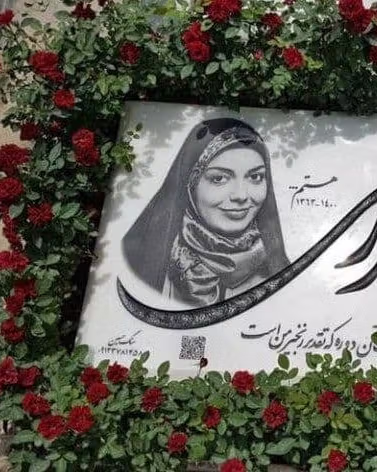
The Iranian regime urged a family to remove the picture of their deceased daughter from the tombstone because it was without a hijab.

The Iranian regime urged a family to remove the picture of their deceased daughter from the tombstone because it was without a hijab.
The municipality of Kermanshah in western Iran said in a statement that families sign a commitment letter not to put the pictures of women without hijab after their death on the tombstone, “but unfortunately this family did not comply with the regulations and must replace it as soon as possible.”
Last year, Iran started policing the compulsory Islamic dress code – or hijab – on tombstones in the country’s largest cemetery, located in the southern part of the capital Tehran.
The cemetery removed scores of gravestones which had pictures of deceased women without veils.
The director of the Behesht-e Zahra cemetery, Saeed Ghazanfari, had stated that the procedure will continue in the future "in accordance with the opinion of [religious] scholars" until all the gravestones with such pictures are removed.
The Iranian regime has also closed at least 2,000 businesses since late March for female customers or staff refusing to wear compulsory hijab, while tens of thousands have lost their jobs.
On April 25, hardliner media outlets reported that some businesses, mainly restaurants and cafes, owned by celebrity artists and popular footballers have been shut down or received warnings over defiance of hijab rules by their staff and customers.
The recent campaign to enforce hijab rules has caused some violent incidents involving pro-hijab vigilantes and women who defy it.
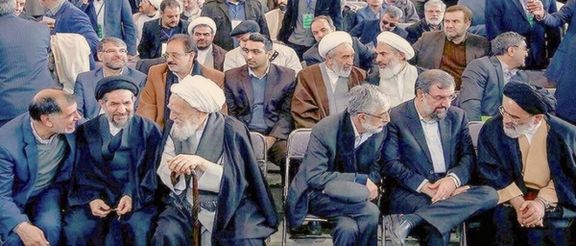
Iran's conservative camp is so divided that it probably cannot be called a "camp" any longer. Gaps have been widening and differences emerging during the past year.
Nonetheless, various conservative groups prepare for the parliamentary election in March 2024 and get together on an almost daily basis, discussing probable alliances.
Divides among conservatives were noted by the media when Majles Speaker Mohammad Bagher Ghalibaf's supporters in February accused the ultraconservative Paydari Party of using the controversy over hijab for political gain as the next election nears.
During the 2020 parliamentary elections, and Presidential election of 2021 conservatives at least pretended to be united in the absence of their reformist rivals.
According to Etemad Online, Conservative figurehead and former Majles Speaker Gholam Ali Haddad Adel warned in March against divides and infighting within the conservative front and suggested that various groups should forget about their differences in the interest of unity of the "revolutionary front."
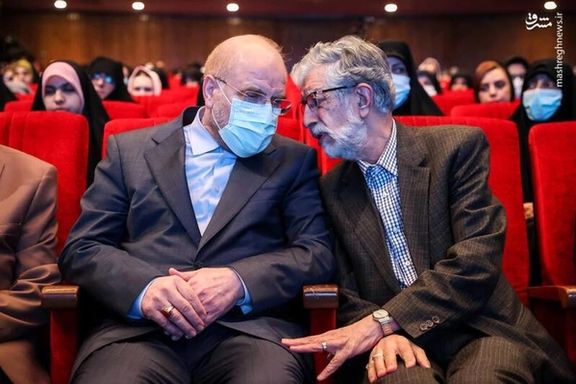
According to the website, when the Society To Promote Popular Institutions of the Islamic Revolution emerged as a conservative alliance in February, it was clearly the same alliance that was called JAMNA (Persian acronym for the Popular Front of Islamic Revolutionary Forces) in 2017, which was led by Haddad Adel.
The alliance was mainly consisting of IRGC-linked Isargaran and Rahpouyan groups. Like 2017, the group once again claimed to be the leading conservative group. Regardless of the word "revolutionary" in its name, the group is a traditional conservative entity. The group's rhetoric, however, looks like the fashionable revolutionary discourse promoted by Paydari, a younger and more aggressive group. Its leading figures are Haddad Adel, Tehran Mayor Alireza Zakani and current lawmaker Zohreh Elahian.
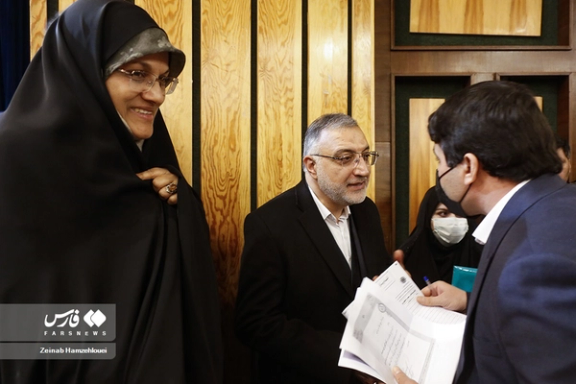
According to Etemad Online, it is evident that decisions about the group and its strategy are made in secret darkrooms rather than transparent congresses. The group is also said to be a rebranded version of SHANA (Coalition Council of Revolutionary Forces), another name for the same group, once again with the code word "revolutionary" which means a group that aligns itself with Khamenei's radical anti-US stance.
However, as a tactic to reduce the significance of Ghalibaf's neo-con allies while giving him prominence as an individual, Haddad Adel is giving the leadership of the group to Ghalibaf, who knows that he has little chance if he remains just as the leader of his neo-con group.
Another conservative group, SHARIAN, the Strategic Network of Supporters of the Islamic Revolution, was established in March with the presence of Vice President Mohammad Mokhber and Roads Minister Mehrdad Bazrpash, firebrand anti-US cleric Mahmoud Nabavian and former hard-line lawmaker Hamid Rasai.
This group's members are known as younger conservatives. Meanwhile, a report in Khabar Online featured photos and a long list of the leading members of the Sharian group mainly to show that they are much younger. The website tagged the next parliamentary election in Iran as a competition between young and old conservatives.
The third group is the notoriously non-conformist Paydari which consists of relatively younger anti-US politicians who have so far defied any alliances in almost every election since 2009. They support a totalitarian Islamic government as opposed to an Islamic Republic which at least pretends to be adhering to some democratic principles. They hold the majority in the current parliament where they ratified reactionary laws against Internet freedom and women's rights.
The group's membership is not transparent. Many members do not openly show affiliation with the Paydari Party, and some others at times distance themselves from the party although it is public knowledge at the parliament that they belong to Paydari.
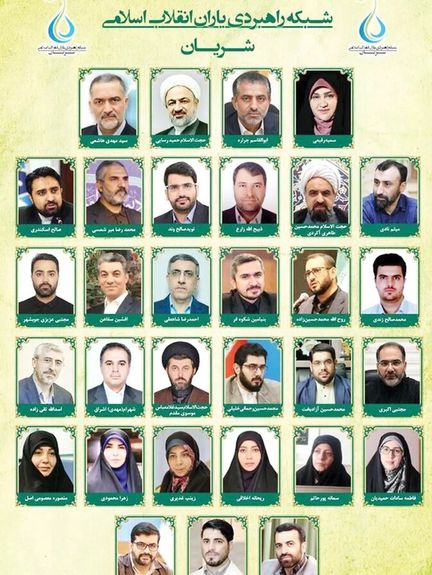
There are also smaller groups such as those who are affiliated with former President Mahmoud Ahmadinejad and the supporters of former Speaker Ali Larijani but they are not big in numbers.
Other groups running for the Majles include traditional parties such as the extremely unpopular Islamic Coalition Party and the allies of former President Hassan Rouhani. The latter group is said to be operating under the leadership of former Interior Minister Abdolreza Rahmani Fazli, a "moderate" politicians who is known for his remarks after the violent crackdown on the 2019 protests: "It is a lie that we only shot the protesters in the head. We shot some in the leg."
However, following the unresolved issues after the 2022 protests, there are every indication that the turnout in the March 2024 could be even less than the elections in 2020 and 2021, which were as low as 20 percent in some big cities.
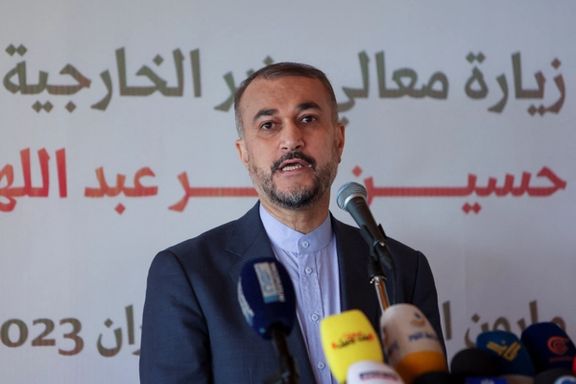
The United States has once again denied a claim by the Iranian foreign minister Hossein Amir-Abdollahian over an agreement regarding the exchange of prisoners.
Amir-Abdollahian, who visited Lebanon on Friday, alleged in a press conference that the Islamic Republic and the United States had agreed to exchange prisoners "13 months ago".
"They introduced an English diplomat lady as a representative. Regarding how to exchange prisoners, an agreement was signed," added Amir-Abdollahian.
However, hours later, the Deputy Spokesperson of the US Ministry of Foreign Affairs said he had no new update to offer in this regard.
“Any comment by Iranian officials …is inaccurate. I would say that most things that come from the Iranian regime I would take with a grain of salt,” Vedant Patel told a press briefing late on Friday.
The Biden administration officials in March also categorically denied Iranian claims that a prisoner swap deal had been reached.
“Statements from Iranian officials that a deal regarding the exchange of prisoners has been reached are another especially cruel lie that only adds to the suffering of their families,” State Department former spokesperson Ned Price told CNN.
A prisoner exchange deal always seemed to be intertwined with a nuclear agreement with the US, but long negotiations in 2021 and 2022 to restore the JCPOA accord limiting Iran's nuclear program failed to reach fruition.
Iran has been accused by Western governments and human rights organizations of detaining Western citizens as hostages to extract concessions.
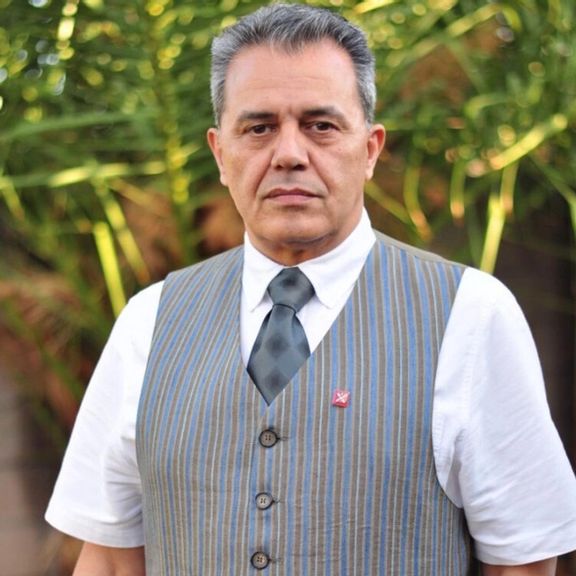
The European Union has condemned the Iranian judiciary's decision to confirm German-Iranian citizen Jamshid Sharmahd's death sentence.
In a statement on Friday, the EU urged the Islamic Republic to refrain from carrying out Sharmahd's death sentence, repeal it and ensure he receives the basic rights to which he is entitled under international law without delay.
“The death penalty violates the inalienable right to life enshrined in the Universal Declaration of Human Rights and is the ultimate cruel, inhuman and degrading punishment,” reads the statement.
Earlier this week, Iran’s judiciary approved the death sentence of Sharmahd, for alleged involvement in terrorism.
Masoud Setayeshi, the spokesman of the judiciary, announced the news of the high-profile case in a press conference on Wednesday.
The news of Sharmahd’s kidnapping in Dubai and transfer to Tehran by regime agents was first released in August 2020. He was accused of heading a pro-monarchist group, Kingdom Assembly of Iran, behind a deadly 2008 bombing and planning other alleged attacks across the country.
Based in Los Angeles, the little-known group seeks to restore the Iranian monarchy that was overthrown by the 1979 Islamic revolution. It also runs pro-Iranian opposition radio and television stations abroad.
Since his arrest, human rights organizations have warned of 67-year-old Sharmahd’s deteriorating health. Sharmahd, who also holds US residency, has been held in solitary confinement and was denied an independent attorney and fair legal procedures. In February, Iran's judiciary sentenced him to death.
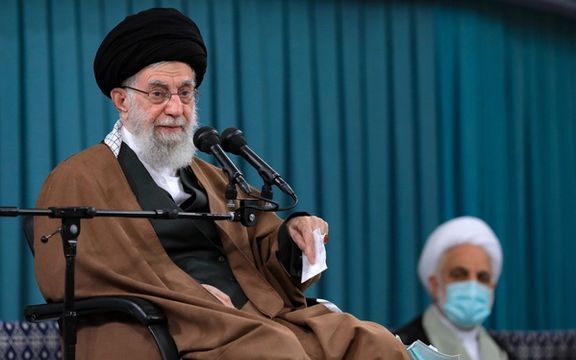
Unemployment is the cause of all social ills, Iran’s ruler Ali Khamenei told a group of handpicked workers Saturday, while at least nine activists were arrested.
Strikes have spread in Iran this week, with workers in more than 100 businesses and plants demanding better pay and work conditions, as Iran’s economy reels under US sanctions, government mismanagement and corruption.
Khamenei, who is the ultimate authority in deciding about an agreement with the United States over Iran’s nuclear program and end sanctions, emphasized the urgency of boosting employment and ending corruption.
However, under tough financial pressures, due to US oil export sanctions, Khamenei’s call for lowering unemployment remains more of a slogan. The same applies to corruption, when under his watch the Revolutionary Guard and religious foundations have monopolized the economy and overwhelming government control has led to the emergence of embezzlements and nepotism by officials.
“I have reached the conclusion that the cause of most [social] ills is unemployment. Addiction, corruption, crime, divorce, and the destruction of families are related to unemployment,” the 83-year-old autocrat said.
His enumeration of Iran’s deep social problems was also a rare admission by Khamenei, who usually praises the achievements of the Islamic Republic, ruled by him for 34 years of its 44-year existence.
While praising workers as the backbone of the country and insisting that they are loyal to the regime, his security forces Friday arrested at least nine labor and teachers activists.
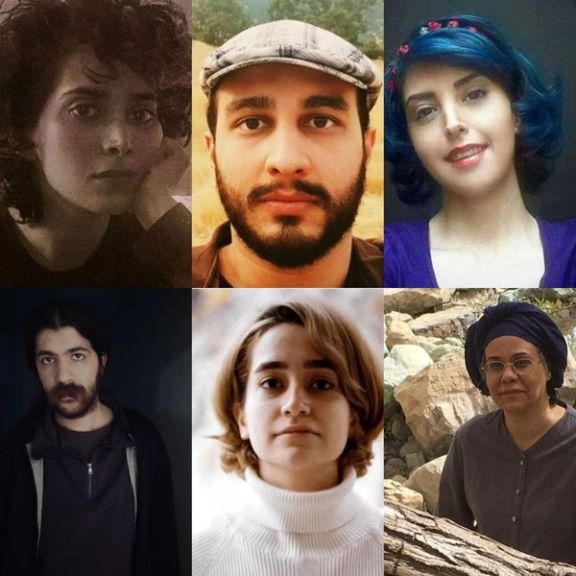
Several teachers’ union activists were meeting at the home of their spokesman Mohammad Habibi when security agents stormed the residence and arrested them. They were taken to Tehran’s notorious Evin Prison, where most political prisoners are kept.
Habibi himself was arrested April 5, just two months after he was released from a previous detention.
He has been persecuted for years, with agents storming his home in 2017 and confiscating his electronic devices. In recent years, he has been twice terminated from his teaching position under the pretext of “unjustified leaves of absence,” while he was in prison.
Khamenei railed against corruption in his speech, saying that if an official does not have the courage to fight corruption, he also does not have will to stand up to “foreign bullies.”
In another rare admission, he said some workers’ protests were justifiable. “Protests against late payment of wages, protests against wrong privatization…these are helpful in informing the regime and the government,” about the prevailing condition in the country.
Khamenei not only faces labor unrest, but also the wrath of many Iranians who see him as ultimately responsible for rising poverty and more restrictions on individual freedoms. Protesters who occupied the streets in 2022 often shouted harsh slogans and even insults at Khamenei.
His hardliner loyalists who control all three branches of government since 2021 have proven inept in making a dent in the economic crisis and the rising political opposition to the regime. Khamenei must know by now that his regime’s legitimacy has been badly damaged.
In an attempt to show that he is on the side of ordinary people, Khamenei said not paying wages on time “is oppression of workers.” Similarly denying them health insurance and job security are also acts of oppression.
He praised the workers for their loyalty to the regime, but reiterating his usual argument about a foreign conspiracy, he said that “foreign ill-wishers” tried to pit the workers against the regime, “but they stood against that, and this is very important.”
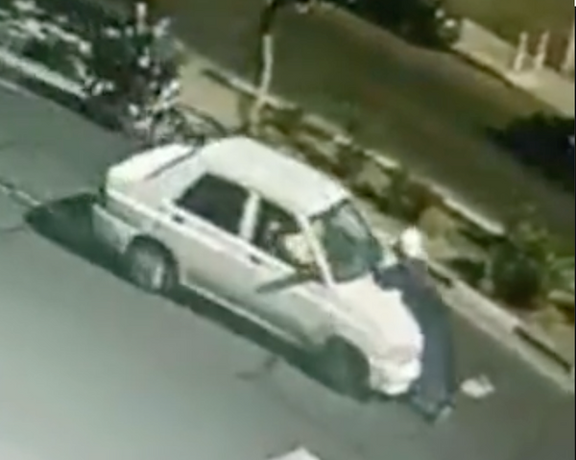
Media close to the Revolutionary Guard say two more clerics were targeted by a driver in the Iranian religious city of Qom after a similar attack on Wednesday.
A vehicle ran over the two clerics injuring them Saturday morning while the driver came out of his vehicle and stabbed one of them, Sabereen News, an Arabic and Persian Telegram channel close to the IRGC Qods Force reported.
The assailant then attacked the police officers and wanted to disarm and take their weapons but was arrested by the agents, added the source.
This is the third attack on clerics within the past few days in Iran. Tehran police on Thursday announced a manhunt was underway to find another driver in the attempted murder of a cleric in the capital.
After parking his car in Marzdaran Boulevard in Tehran at 9 am on Wednesday, the 35-year-old cleric was the victim of a car ramming, police said in a statement.
The culprit fled the scene and the cleric's health status has not been disclosed.
As another sign of rising anger against clerics, a bank guard shot and killed a senior cleric in northern Iran on Wednesday, according to CCTV footage.
Abbas-Ali Soleimani was the most senior clergyman killed in months of unrest that has rocked the country since the death in custody of Mahsa Amini.
In surveillance footage shared widely by Iranian media, the shooter was seen calmly approaching the cleric carrying a firearm, milling around briefly, and then shooting him.
Protesters have been targeting clerics in Iran's latest protests. Since the 1979 revolution, the clergy have gained increasing power, but discontent has risen in recent years, particularly amid waves of protests over economic, political, and civil rights issues.